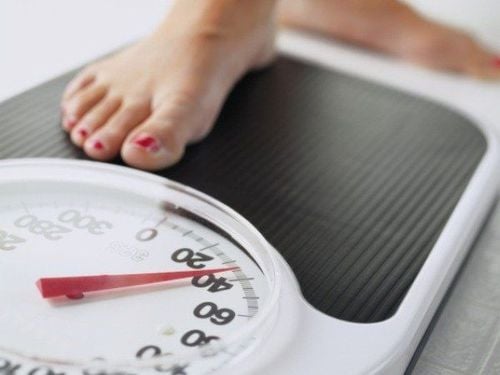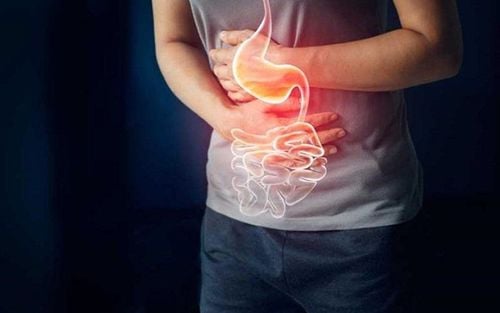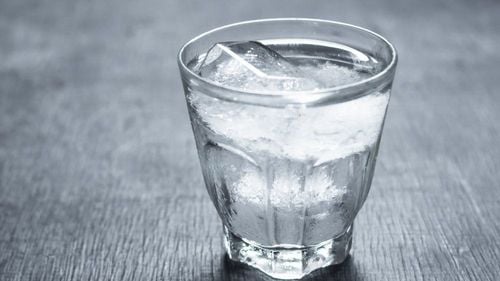This is an automatically translated article.
Daily weight fluctuations are considered fairly normal activities. As an adult's weight can range from about 2.5kg - 3.0kg per day. All of this change depends on diet, exercise and even sleep and rest for a day. This article will provide more information to help you better understand this change.1. Your Diet
Weight is determined by the number of calories consumed in a day compared to the number of calories the body burns. A healthy, balanced diet that can show how many calories the body uses on a daily basis reduces the risk of significant body weight fluctuations over time and possible weight changes from day to day. . But to implement a reasonable diet every day is also a challenge for each person. For example, if your diet is decreasing, you may find that your weight fluctuates more than normal. The balance between energy in (eating) and energy out (burning those calories) is why your weight fluctuates. If you take in more calories than you burn, you will gain weight, sometimes immediately.
2. A diet that includes sodium and carbs can cause water retention in the body
Foods high in salt and carbohydrates can cause the body to retain water. Or your weight could skyrocket if bloating eases. You can minimize water retention by cutting out food products that contain sugar, salt or processed foods.
You can use foods rich in potassium and magnesium to add to your diet to help your body balance sodium levels in the body to minimize water retention that causes daily weight changes. .
All types of dishes and foods provide calories and nutrients and can cause weight gain after eating. For example, a glass of water with a volume of about 240 grams, can increase the body's weight, because water also has mass. The same is true for vegetables or salads in the diet to maintain and control weight. However, healthy foods and water pass through the body quickly so a balanced diet is less volatile. But foods rich in carbohydrates, sodium, and fats take a long time to process and eliminate from the body. So urine and faeces can also be a factor in the change in body weight. Because this process is done in the way food is used in the body to hydrate and provide energy. After the nutrients are absorbed, the waste will begin to be expelled through the passages such as mucus, sweat, urine and feces.
3. Scale and time to check body weight
The option to use the scale is also very important to check the daily change of a person's weight. Regardless of the type of balance you use, you need to pay attention to the technique and the time it takes to measure.
Morning is usually the best time for you to get the most accurate results of your body weight. You've had a good night's sleep and probably haven't eaten much. This can be explained specifically: The lowest weight of the day will be calculated after you wake up. You can weigh yourself at a different time of day, but must continue to perform this activity at that time on the same scale for accurate readings. If you want to assess your average weight fluctuations. Weighing yourself throughout the day won't measure total weight gain or weight loss, but will help you gauge your overall weight fluctuations over the course of the day. day.
Alternatively you can use a combination of other measurements to measure your body composition and overall weight. Measuring your waist, arms, and other areas can also tell you how your body is changing. However, body size is not the only way to assess overall health.

Cân nặng thay đổi thất thường có thể do thời điểm kiểm tra của bạn chưa chính xác
4. Change your habits and practice
This process of expending energy by burning energy can effectively help with weight loss. But if you provide your body with enough water, this change may not be immediately visible. Because the amount of water you drink this product can replace the water lost through perspiration. However, water contains no calories and will not cause weight gain over time for the body.
Exercise can effectively burn calories of the body, so if you burn more calories than you consume, you will lose weight. However, for those who are just starting out or changing their habits, it can cause their body weight to increase more than before in a short time by starting to build muscle mass of the body.
5. Exercise selection
Some athletes can lose 6% - 10% of their body weight after a workout, and this loss is mainly due to sweating. Your weight change may not be too drastic, but it is possible to lose about 0.5 to 1kg after the training session.6. Medications in use
Some drugs cause the body to retain water, increase appetite or change the body's metabolism. Many medications, including anti-inflammatory drugs, antihistamines, and opiates, can cause rapid weight loss. Other medications such as antidepressants and some anti-seizure medications, or insulin can cause you to gain weight quickly.
If you are thinking that medicine can change your body weight, you should see your doctor for specific advice. Your doctor or specialist can help you identify the reasons for the change in body weight. And from there, your doctor or specialist will help you develop a plan to use medicine as well as adjust your diet and exercise.
7. Drinking too much water compared to daily needs
One liter of water weighs about 1kg. If you only drink water and don't exercise it will show up immediately with the change in weight. However, that does not mean that you leave water out of your daily drink list. In the long run, drinking water can help with weight loss, but not sugary, carbonated drinks...

Uống quá nhiều nước có thể khiến cân nặng thay đổi thất thường
8. Not drinking enough water compared to daily needs
According to statistics, the water content in the body can range from 55% - 75% of the body. If the percentage of water in the body is too low, it can make you feel like dry skin, headaches. But if the body water ratio is quite high, it can make the body uncomfortable and feel difficult to think.
9. Use coffee
Coffee and health studies show that one cup or three cups of coffee can help you control your weight. Caffeine helps curb your appetite or burn a few calories. But you also need to be careful with drinks that are high in sugar and calories. Because they can be a factor that causes weight changes in the direction of increasing.
10. Salt
Too much salt in the diet is bad for the heart. Salt can also cause your body to experience water retention, which leads to an increase in your weight. Plus, people on a high-sodium diet tend to eat more processed foods and snacks or fast foods. These foods are all high in fat and calories - one of the causes of rapid weight change and can even cause adverse health effects.
11. Menstrual cycle
Your menstrual cycle can cause the body to retain more water during certain times of the month, leading to slight weight gain or possibly weight fluctuations. You may notice that your basal weight is slightly higher than normal on the first day of your period. Your daily weight will likely return to average within a few days of your period starting.
12. Your sleeping habits
Studies show that you sleep more or less can also change weight. For example, after sleepless nights, you may feel hungrier than usual. That can cause you to eat more meals, which can lead to weight loss later in the day.
13. Drinking alcohol
Alcohol is not processed in the same way as regular drinks and foods, so it may take longer for the body to absorb and remove waste from the body. Furthermore, alcohol also slows down the digestion of other substances, which can lead to water retention.
In addition, alcohol is quite rich in calories that you may not be including in your overall diet.

Cân nặng thay đổi thất thường có thể do bạn sử dụng rượu
14. Age
You may not see your weight change the day you turn 30 or 40 or 50. But as we get older, many of us gain weight naturally, which could be due to us. be less active or have other changes such as menopause. After about age 60, you may start to lose your appetite or have difficulty chewing, or you may become ill or depressed which may cause you to lose weight.
15. Health Status
Your weight may increase or decrease after an illness, such as the flu, or due to a chronic medical condition. Even so, while conditions like an underactive thyroid, Cushing's syndrome, and polycystic ovary syndrome can lead to unexpected weight gain, diabetes and Crohn's disease are often associated with weight loss. desire, can sometimes be a loss of control.
If you are experiencing other unusual symptoms - or have an underlying medical condition diagnosed, see your doctor. They can determine if your symptoms are related to an underlying condition and advise you on next steps.
Above are the reasons why your weight changes by day, you can refer to it to better understand this situation.
Please dial HOTLINE for more information or register for an appointment HERE. Download MyVinmec app to make appointments faster and to manage your bookings easily.













